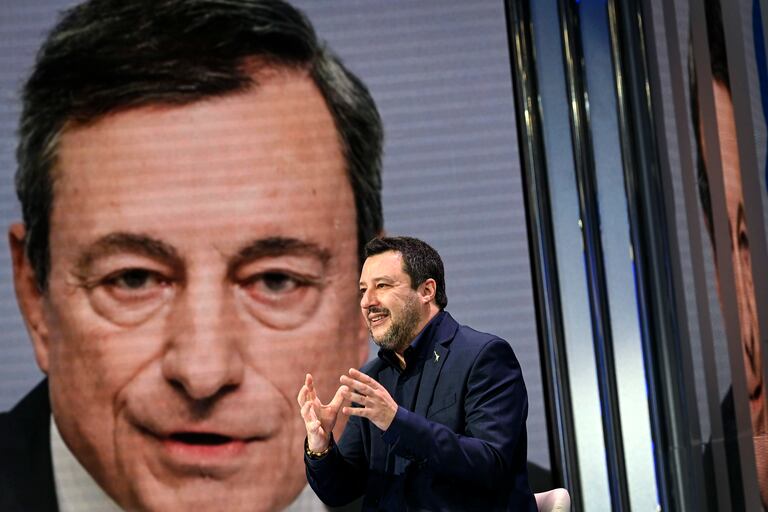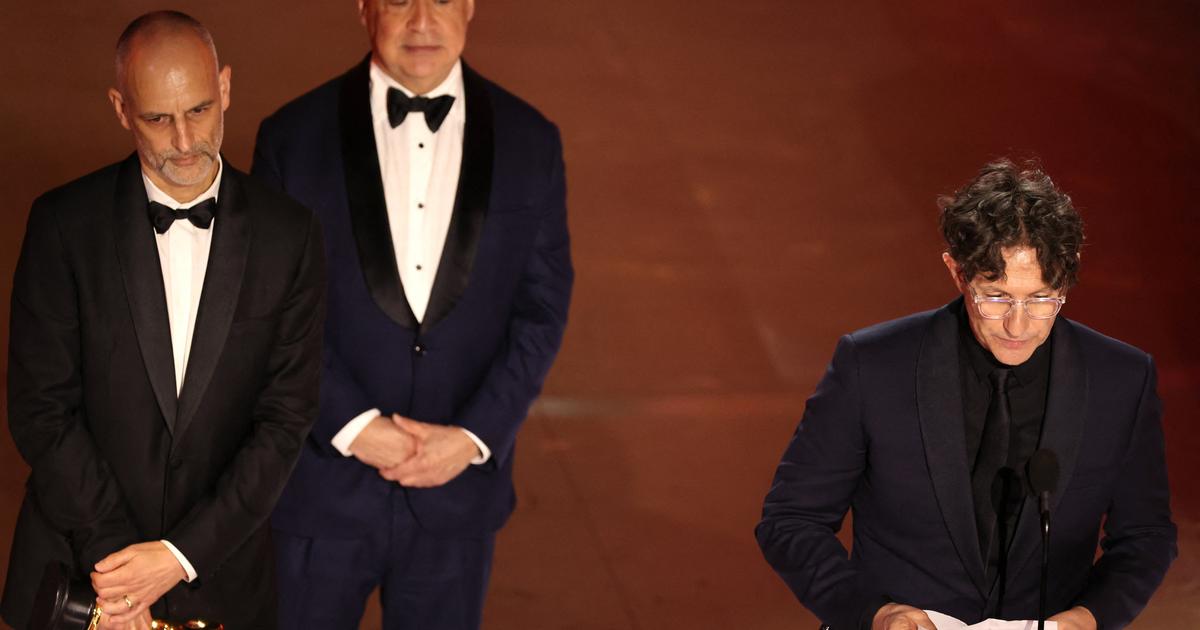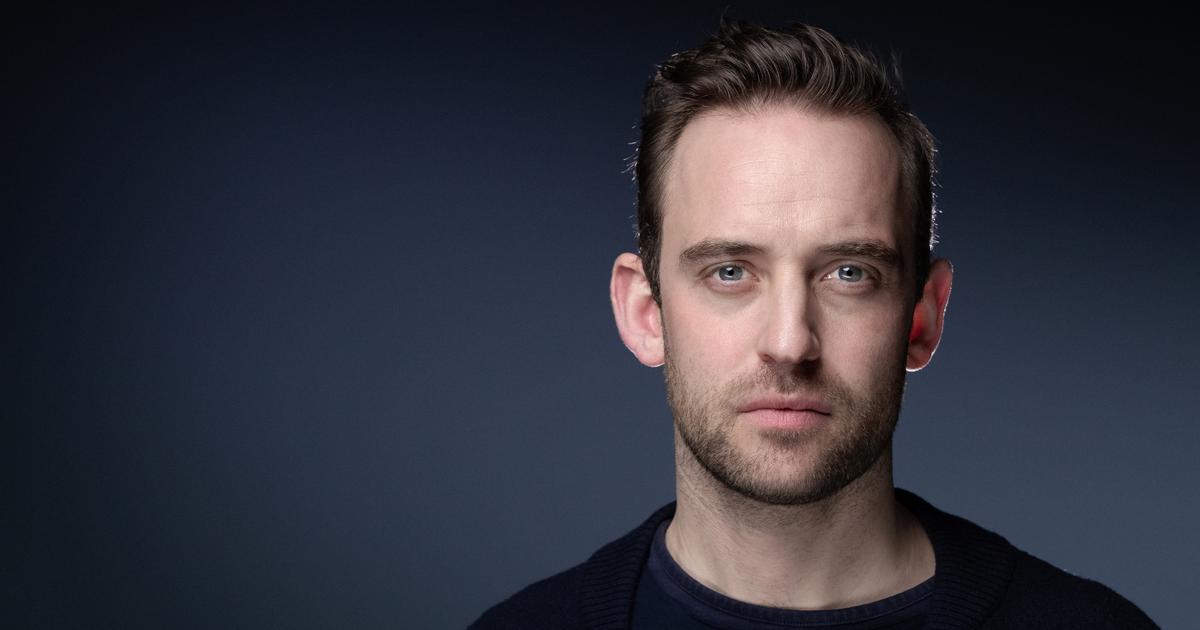Italian League party secretary Matteo Salvini speaks against the backdrop of an image of former ECB president Mario Draghi in Rome, Italy, on February 11, 2021.RICCARDO ANTIMIANI / EFE
Giuseppe Conte went to sleep in his apartment in the center of Rome on January 27, confident that he would survive.
Again.
He had just convinced Luigi Vitali, a senator used to living off parliamentarism and jumping between the benches on the right, to be part of a group of turncoats who would cover the attack by Matteo Renzi.
Conte had been in the Chigi Palace for two and a half years and had already led two executives: with the extreme right and with the Social Democrats.
He said one thing and then the opposite.
He signed decrees against immigrants, and abolished them a year later.
Why not a third time, his advisers reassured him.
This Vitali was a good sign.
The first call the next day brought him down from the cloud.
"President ... Vitali has backed down," he heard from his private secretary.
Matteo Salvini and Silvio Berlusconi had detained the defector at dawn.
The name of Mario Draghi, although the Quirinal Palace denied it, had already been on the table for days.
The threat of elections was a bluff.
Nobody wanted them, the operation was going in another direction.
Conte felt those days that he had been teased.
He learned with that call that a cycle in Italy was ending.
The 5 Star Movement (M5S), an anti-establishment party founded by the comedian Beppe Grillo and articulated through an opaque digital platform, threw the door to the floor of the Roman palaces shouting "
Vaffanculo
!"
[to fuck in the ass] in March 2018. Italy, an aging country that had not grown economically for 20 years, became the largest populist laboratory in the world.
Within a few months he began to display his anti-Europeanism, nationalist leanings, a bitter resentment for the single currency.
Authoritarian tics, contained for years in a cracked system, surfaced.
Steve Bannon, Marine Le Pen or Santiago Abascal paraded through Rome and an international campaign against Pope Francis began that fractured the Church.
Less than three years later, however, Italy has handed over the government to Mario Draghi,
primadonna
of
the
European
establishment
.
The magician who rescued the euro and to whom all parties are entrusted to repeat the trick in Italy.
Chaos is inherent to transalpine politics, accustomed to volatility that has wiped out 65 governments and around thirty prime ministers since the Second World War.
The perfect bicameral system - Senate and Chamber of Deputies - is today the room where to put and remove prime ministers without going through the polls.
Berlusconi was the last in 2008 to gain that rare legitimacy.
Since then, Chigi Mario Monti, Enrico Letta, Matteo Renzi, Paolo Gentiloni, Giuseppe Conte have passed through the Palace.
Neither won an election.
And many, like Conte or Draghi, were not even MPs.
There are many reasons.
Transfuguism is an important key: 147 cases in this legislature alone.
Also the proportional electoral system.
But the last great storm escapes even the logic of the Italian seismograph.
In less than three years of legislature, Italy is on the way to having its fourth government.
And M5S, a party that was never going to ally itself with other formations, will have already done so with almost the entire parliamentary arch.
Money helps.
209,000 million euros must be distributed - between loans and non-refundable capital - from the EU.
And the parties that arrived in 2018 to liquidate the old policy, this is the fabulous paradox, are today guarantors of the stability of the system.
They were not always like this.
A populist gale swept away the old politics in March 2018. The country's economy and credibility suffered greatly, as Italian economist and former Italian Treasury Secretary Lorenzo Codogno points out.
It also created insecurity for foreign investors.
"Especially painful were the rise in the risk premium and the stagnation of growth, at the bottom of Europe," he recalls.
Especially taking into account that Italy is the second most indebted country in Europe (during the crisis, public debt went from 99.8% of GDP in 2007 to 132.1% today).
But the actors of change were not new.
THE ORIGIN OF THE STORM
The Renzi referendum (December 2016)
Matteo Renzi, the shining mayor of Florence, always had the last word.
Quick, foul-mouthed, brilliant, and insultingly young, he entered the Chigi Palace in 2014 converted, at the age of 39, into the oldest prime minister of the Italian Republic.
No one had voted for him.
He achieved the position with the first of his great palace moves, betraying his party partner, Enrico Letta, and dislodging him from the presidency of the Council of Ministers.
In a tremendous speech in the Senate, he presented himself as the
rottamatore
[
scrapper
] of old politics before the stunned faces of the glories of his own party (then it was the PD).
Renzi is the alpha and omega of the Italian turmoil of this decade.
The Florentine appears in all the photos of the crises of recent years.
“That is its nature.
When you don't rule or can decide, you need to notice the power.
It's mental, ”says a close collaborator for years.
Renzi or chaos, came to promise.
And he held the position for almost three years.
The country made reforms, grew and repainted something in the great dossiers of Europe.
But I wanted more.
Because Matteo Renzi is like Jep Gambardella, that protagonist of the
Grande Bellezza
by Paolo Sorrentino.
An eternal dissatisfied who was not content to participate in the best parties, he also wanted the power to derail them.
The then prime minister called an ambitious constitutional referendum in December 2016 to reform the system.
What he proposed made sense, everyone agreed: simplification of the Senate, binding a five-year term to whoever won the elections ... But he did not resist the temptation to be the protagonist and offered his head if he lost the bet.
“I did not attend to anyone.
Many of us advised him to change the roadmap ”, recalls one of his advisers at the time.
The 2016 referendum unintentionally became the best electoral campaign of the 5 Star Movement.
And the
grillinos
, a party that had already won the previous elections, worked hard.
“That consultation gave oxygen to 5 Estrellas to express itself on the street.
A part of the country believed in the reform, but Renzi was already an unpleasant character for many ”, remembers Roberto D'Alimonte, director of the Italian Center for Electoral Studies.
The campaign was tough and Italy discovered the power of networks in politics.
Characters such as Luca Morisi, an expert in digital communication and Salvini's court advisor, or Rocco Casalino, a former
Big Brother
contestant who
later became Conte's spokesman, took over the anti-system story.
"They are crucial in the democracy of the
like
[I like]", emphasizes D'Alimonte.
Renzi fell and gave way to a transitional year with Paolo Gentiloni (17 months).
Italy confused boredom with stability in those days.
THE EXPERIMENT
Liga y Movimiento 5 Estrellas
(September 2018)
The March elections left a puzzle almost impossible to solve with a majority.
Faced with ungovernability and an electoral repetition, the two anti-system parties, populists and Eurosceptics, agreed on a spoil of more than 50% of the votes.
There was nothing like it in Europe.
The storm, however, had been brewing long before, says Enrico Letta, former Prime Minister of Italy and dean of International Affairs at the prestigious Science Po in Paris.
“The elections were held at a time of multiplication of anti-system sentiment that brought about this explosive result.
The global trend was already Trump-Brexit.
At the beginning of 2018, the drunkenness of that feeling was maximum and configured the disruption of the logic of the integration of Europe.
And Salvini was a key partner in that project.
A legislature governed by the PD was ending, which in the elections only obtained 25% of the votes.
His governments had succeeded one another with ruptures, splits, referendums ... A situation of decomposition that took him until 2018 after ruling for five years completely exhausted and without credibility.
Renzi had already become the model of a politician only in the palace playing strategy ”, he points out.
The two parties signed a government contract and put in front a figure so neutral as to be able to control it from the two adjoining offices, which were reserved by the leaders of the M5S, Luigi Di Maio, and that of the League, Matteo Salvini.
The formations stopped fighting to place one of their own as prime minister.
The interesting thing happened to be having an elegant figurehead and fighting for control of communication and key ministries, turned into independent kingdoms.
Conte was erected in June 2018 in the Sistine Chapel of this experiment of the new politics.
And Casalino, his spokesman, is the second most influential person in the Executive.
Filippo Ceccarelli, historical chronicler of
La Repubblica
and author of
Invano
(Feltrinelli, 2019
)
, a review of the evolution of the political class in the last 50 years, believes that technology has been fundamental in this fragility.
“When the antisystem came to the government, they had to show that their action changed reality.
They wanted to show plastically that things changed and they resorted to the easiest resource: communication.
But technological evolution has been determined in all of us, also in leaders, in a lack of interiority.
Inside man there is no room for ideology, for passion ... there is a void that makes everything seem like empty boxes that can be easily refilled.
And so things happen that we imagine impossible.
Today the Beppe Grillo who shouted
"Vaffa!"
sits down with Draghi.
That is the evidence ”.
Conte has served as prime minister for 954 days, divided into two executives.
He is the 11th with the longest life expectancy, behind Matteo Renzi (1,017 days) and a long way behind the first: Silvio Berlusconi (3,291 days and 4 executives).
He introduced himself as an unknown lawyer.
But, in reality, he belonged to the gear of the system, as Ilario Lombardo, a journalist for
La Stampa
who has followed him this time
, recalls
.
“They were looking for someone neutral and they looked at the M5S charts.
He had experience in justice and a strong link with the Vatican, through his
number 2,
the Secretary of State, Pietro Parolin ”.
Contact across the Tiber was crucial.
But also in the offices of the Council of State, a quarry of the high Italian civil service and chiefs of the Cabinet, an establishment of excellence that keeps the country standing.
"The caste", according to the party that won the elections.
THE 5 STARS MOVEMENT
Wild Days
The 5 Star Movement promised the Moon when it came to power.
They had never governed and promised to always do so without allying themselves with any party.
He pointed to the south, where places like Calabria have half the per
capita income of
the north, or the life expectancy can be three years less: there he obtained 45% of the votes.
He also addressed young people, whose unemployment rate is currently 27.1% (the European average is 14.2%) and promised to solve their problems.
But he quickly discovered that money determined the real dimension of dreams.
The citizen income signed in the campaign, a kind of universal basic salary of 780 euros, could not be accommodated in the budget.
The then Minister of Economy, Giovanni Tria, a cautious man, planted himself in a deficit figure that prevented him.
So the prime minister's spokesman, Casalino, made it clear to a journalist in a leaked conversation.
"We sweat it, we will put them to the knife.
Tria paints little, the problem is that in the ministry there are a number of people who have been protecting the mechanism, the system for years.
It is not acceptable that the 10,000 million of the balls are not found.
If they don't, we'll dedicate all of 2019 to kicking those shits out. "
He was referring, coincidentally, to Daniel Franco, whom Mario Draghi has just appointed Minister of the Economy and was then director general of the Bank of Italy.
Thus began the negotiation of budgets that became the first challenge to Europe.
The reality is that no one killed anyone.
And the wine - also the excess deficit with which Italy threatened Brussels - gradually turned into water.
Until we end up voting for Mario Draghi and invoking institutional responsibility.
The political scientist and essayist Piero Ignazi, recalls how the party represented a disadvantaged class and was later transformed into another piece of furniture in the elegant
establishment
hall
.
“The 2018 vote was the rejection of a policy that did not answer the questions of the citizens.
That is why the M5S exceeded 45% throughout the South.
It was a hegemonic party.
They won with the idea of anti-politics and a position of universal welfare.
But today they are the hinge of a political system, accepting all its contingencies.
It is an extraordinary journey and could end up being the party of stability ”.
Another formation made a similar trip.
THE ENIGMA SALVINI
The extreme right who died in a beach bar
Matteo Salvini, a shy and taciturn activist, led for years the communist current of the Northern League.
He wore Che Guevara shirts, but he also chanted slogans against the south and insulted the Neapolitans.
He directed Radio Padania for a time, where he hardened his character in hand-to-hand with listeners and refined his communicative method.
After years of looting, Lombard folklore, and cronyism between founder Umberto Bossi and Berlusconi, the old Northern League was about to be scrapped in 2013. Leaders were missing and some godparents thought of him.
When he was appointed secretary of the League, the party barely reached 4% of support.
But he had a plan.
In the 2014 congress there was a radical change.
In the front row, the new leader seated Víktor Zubarev, a Russian parliamentarian representing the government of Vladimir Putin, a member of Marine Le Pen's National Front and Geert Wilders, of the xenophobic Dutch Freedom Party.
That staging brought forward Salvini's international strategy and the beginning of a new political scheme in Europe that passed through Hungary and Poland.
The ultra strategy, added to a radical policy against illegal immigration - it has two pending processes to prevent the entry to Italy of ships with rescued immigrants on board - turned it into an electoral cyclone.
The Salvini League is today an ideological Swiss Army knife.
“He doesn't believe in anything, and that's why he can say what he wants.
Then and now, which has exhibited an unusual Europeanism, "says a deputy of the Brothers of Italy, a member of the right-wing coalition and the only party that will not support Draghi.
The problem is that the extreme right received in Italy the moral cover and the experience of the center, embodied by Forza Italia.
Many, such as Renato Brunetta, economic head of the party and now Minister of Public Administration of the Draghi Executive, never agreed with this strategy.
“This started with the populist and sovereignist wave at the international level.
The election of Trump, the wind that here joined that of extremism and found in Grillo its prophet of the
Vaffanculo
.
The League did not have these characteristics, but they took advantage of that wind ”.
And it worked for 14 months, in which he turned his tenure in the Executive into a challenge to Europe and a perennial electoral campaign.
Salvini, still Minister of the Interior and Vice President of the Government, stood on August 5, 2019 in a beach bar with go-go,
house
music
and
cocktails
on the Adriatic coast.
The leader of the League took off his shirt, ordered a mojito and dared to play the Italian anthem while some girls waddled around on the podium.
The polls smiled at him and in the street they stopped him shouting "
Capitano
".
That day he decided that he would overthrow the Government of Italy.
"He did not even know that there were several operations underway behind his back," recalls a historical leader of the League, today at odds with the leader.
Salvini could not decipher the message that arrived a few days before from Brussels.
OPERATION URSULA
A European Government (September 2019)
Ursula Von Der Leyen was not guaranteed the presidency of the European Commission in July 2019 as she did not reach 50% of the votes.
But a party that had met with the Yellow Vests, wanted a referendum on the euro and had sat in Brussels with Nigel Farage's Ukip, swerved and saved his candidacy.
"The 20 parliamentarians of the
grillinos
allowed it to overcome that equator and the M5S began its evolution to a Europeanist logic", remembers Enrico Letta.
It was a question of survival, like so many others in the life of the anti-establishment party.
But that milestone was the ultimate paradigm shift.
Also the beginning of the isolation of the League, which was left alone voting together with the European extreme right.
The protagonist of that photo is once again Renzi, who made Salvini believe that he would support him in his attempt to overthrow Conte in August.
The Florentine gave birth to a new government, this time made up of the people of
Gràcia
, and the center-left parties of Italia Viva, the Democratic Party and Free and Equal.
An artifact gestated in the Von Der Leyen vote.
But with the sole purpose of curbing the momentum of the extreme right and reaching 2022 united to elect the new President of the Republic, as Maurizio Landini, general secretary of the CGIL, the majority union in Italy, recalls.
“The pandemic has raised the contradictions.
A crisis has reopened when it was necessary to decide where to invest the money that Europe gave us.
But disasters in the world of work have not only been in recent years, but in the last two decades.
In the last phase there were not only negative things.
Layoffs were also blocked, job security was increased… ”, he points out.
But the Executive's days were numbered.
Giuseppe Conte visited the Basilica of Saint Francis in Assisi last October.
The pandemic was tightening, but its popularity hovered around 60% levels.
"There was no reason to think they could kick us out," says a direct aide to the prime minister.
After the spiritual and gastronomic movement to which the monks subjected him, he received valuable advice from one of them.
“Don't trust Renzi, President.
It is the devil ”.
The end of this story indicates that he did not take it into sufficient consideration.
DRAGHI
The Apostle (February 2021)
Mario Draghi left the presidency of the European Central Bank in October 2019. Since then he has lived between Rome and Città della Pieve, in Umbria.
He never imagined accepting the post of prime minister, those who know him say.
"His idea, in any case, was to hold the presidency of the Republic of Italy", says a person who has spoken with him lately.
But things went wrong and Mattarella only wanted the banker.
Italians respect him (67%, according to the latest Ipsos poll, wanted his election).
It was the only name that could generate social consensus.
“The unions have received the man from the financial oligarchy very favorably.
It has been seen that it is not something improvised.
There are pension prospects, very clear social problems.
It has been one of the most clear supports ”, says Piero Ignazi.
The former president of the ECB entered the Chigi Palace for the first time on Saturday.
But the stock market had turned green during the week and the risk premium, at pre-crisis levels.
There will be reforms in the justice, the treasury, the public administration and the welfare system.
But also, money in abundance.
That is the difference with the failed experience of Mario Monti, the last technical government.
The year Italy will preside over the G20, a period in which Emmanuel Macron will enter the election campaign and Angela Merkel will end her term, the country that embraced anti-Europeanism only a year and a half ago could become the new EU flag.
Draghi, beatified before the miracle, will have to deal with the
guillotine
of the parties.
The average life expectancy of a prime minister in Italy is 14 months: the clock has started.









